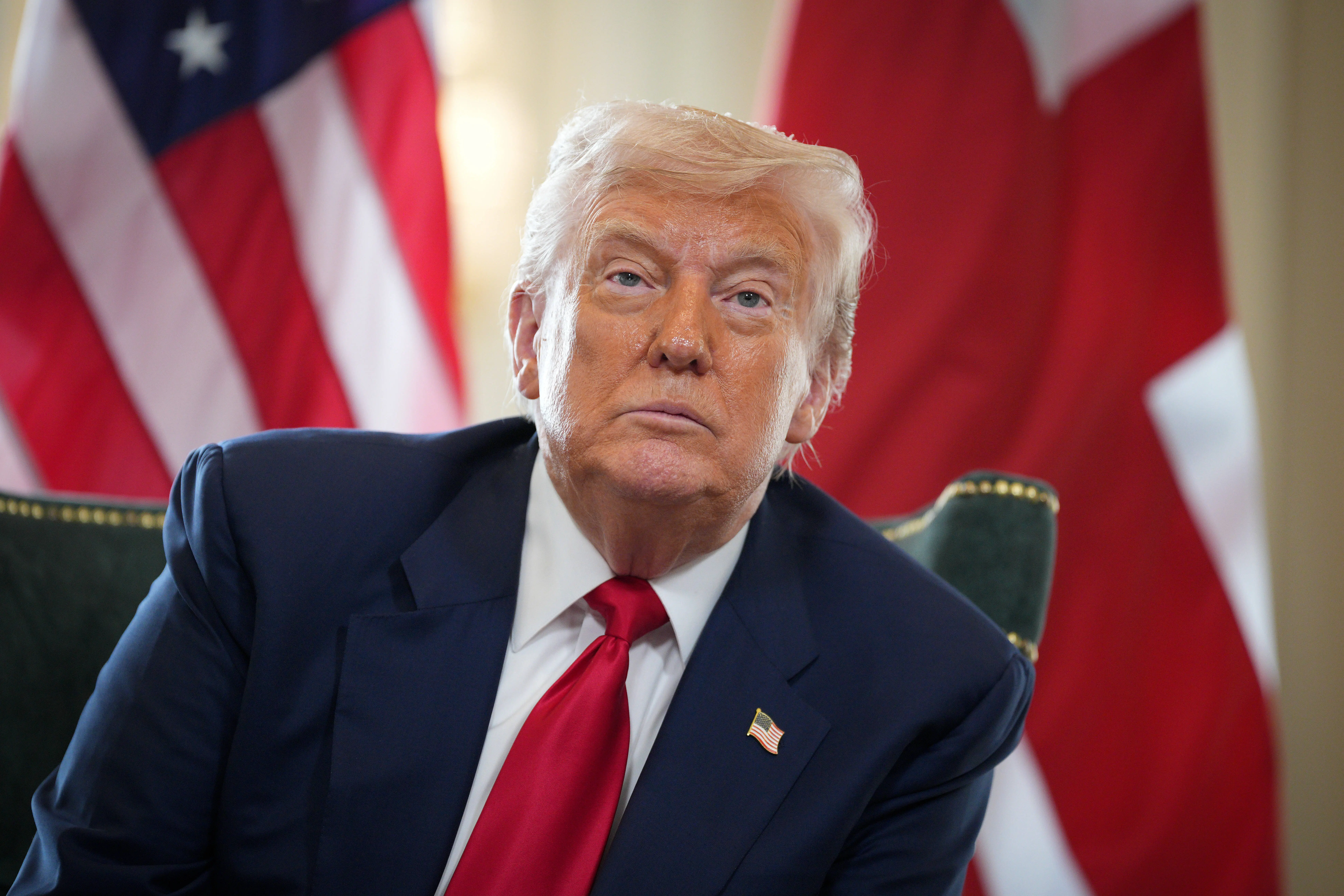Al Sharpton’s MSNBC show has Donald Trump asking the FCC to "look into the licence of NBC"
-
 TURNBERRY, SCOTLAND - JULY 28: U.S. President Donald Trump talks to the media as he meets with British Prime Minister Keir Starmer (not pictured) at Trump Turnberry golf club on July 28, 2025 in Turnberry, Scotland. U.S. President Donald Trump is visiting his Trump Turnberry golf course, as well as Trump International Golf Links in Aberdeenshire, during a brief visit to Scotland from July 25 to 29. (Photo by Christopher Furlong/Getty Images)
TURNBERRY, SCOTLAND - JULY 28: U.S. President Donald Trump talks to the media as he meets with British Prime Minister Keir Starmer (not pictured) at Trump Turnberry golf club on July 28, 2025 in Turnberry, Scotland. U.S. President Donald Trump is visiting his Trump Turnberry golf course, as well as Trump International Golf Links in Aberdeenshire, during a brief visit to Scotland from July 25 to 29. (Photo by Christopher Furlong/Getty Images)In yet another clash between politics and the media, Donald Trump has reignited controversy by calling for the Federal Communications Commission (FCC) to investigate NBC’s broadcast license. His comments, shared on his Truth Social account, specifically targeted Rev. Al Sharpton and his long-running MSNBC program, PoliticsNation. The president’s post has drawn attention not only for its criticism of Sharpton and NBC’s leadership but also for the misunderstanding of FCC jurisdiction over cable networks.
As discussions over Trump’s remarks continue, PoliticsNation — now more than a decade old — finds itself back in the spotlight, not for its ratings or political analysis, but for being at the center of a renewed feud between the former president and a prominent civil rights leader.
Trump’s call for an FCC probe into NBC and MSNBC
In his Truth Social post, Donald Trump accused NBC and its affiliate MSNBC of broadcasting “almost exclusively positive Democrat content,” and claimed that this was reason enough for the FCC to “look into the license of NBC.” He linked his demand to Al Sharpton’s continued presence on the network, suggesting that Sharpton’s show had “one of the lowest ratings in television history.”
Trump also revisited his past interactions with the activist and TV host, alleging that Sharpton had once been a “major Trump fan” who sought his presence at rallies to attract larger crowds. The former president’s message went further, referencing the infamous Tawana Brawley case from the late 1980s, which damaged Sharpton’s credibility early in his career. Trump’s post included an old photograph of Sharpton, apparently meant to ridicule him, and accused Brian Roberts, the Comcast chairman, of keeping Sharpton on-air for political correctness.
The controversy reflects a familiar pattern for Trump, who has repeatedly suggested punitive measures against media outlets critical of him. In 2017, during his presidency, he made similar comments about NBC after reports emerged questioning his administration’s handling of nuclear policy. Media and legal experts have noted that such demands ignore the First Amendment, which protects freedom of the press and prevents government interference in editorial decisions.
Adding another layer to the debate, Trump’s former FCC chairman, Brendan Carr, recently made headlines for his remarks against ABC following comments from late-night host Jimmy Kimmel. Carr’s statements drew political backlash, with critics accusing the agency of bowing to partisan pressure. It’s within this environment that Trump’s latest comments have surfaced, sparking both media scrutiny and renewed public debate on whether political leaders should wield influence over broadcasters.
The Role of Al Sharpton and His MSNBC Show
Al Sharpton’s program, PoliticsNation, has been a fixture on MSNBC since 2011. Initially airing on weekdays, it was later moved to a weekend slot in 2015, where it continues to air every Saturday and Sunday at 5 pm ET.
Sharpton himself has long been a polarizing figure in American politics. A former Democratic presidential candidate and the founder of the National Action Network, he’s played a central role in racial justice movements for decades. His relationship with Trump has also seen dramatic shifts — from their acquaintance in New York’s public and business circles to public animosity as their political paths diverged.
In recent years, Sharpton’s outspoken criticism of Trump’s policies and his visible support for Democratic candidates, including Kamala Harris during her 2024 campaign, have likely fueled the tension. Nonetheless, PoliticsNation continues to air on MSNBC, which, according to reports, is set to undergo rebranding later this year as MS NOW under Comcast’s corporate restructuring plans.
For Al Sharpton, the attention may only reaffirm his relevance as a commentator and activist. As PoliticsNation continues into its second decade, the show remains a symbol of MSNBC’s progressive identity — and a reminder that in the age of polarized politics, even long-running programs can become flashpoints in larger national debates about media, race, and power.
TOPICS: Donald Trump, MSNBC, NBC, Rev. Al Sharpton
- “I would donate”: Fans suggest Chuck Redd GoFundMe campaign as Kennedy Center president seeks $1M from jazz musician over canceled Christmas show
- "This is not ideal timing with everything going on": Internet reacts as Trump calls 8-year-old's voice "beautiful and cute" during NORAD Santa tracker calls
- Bill Clinton reportedly calls for full release of Epstein documents to avoid ‘insinuation’
- When will the Epstein files be released? Trump’s DOJ confirms release time